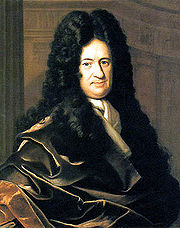Gottfried Wilhelm Leibniz
Gottfried Wilhelm Leibniz (1646-1716) was, with Descartes and Spinoza, one of the leading rationalists, and among philosophers perhaps best known for his view that the universe is ultimately composed of "simple souls" called monads. Among students of mathematics Leibniz is celebrated for his discovery of the infinitesimal calculus made at about the same time as Newton (in the 1670s). Leibniz devised a notation for derivatives of functions which is more convenient and more widely applied than Newton's fluxion notation. Newton, Leibniz, and above all their followers, had a famous and unpleasant priority dispute about the discovery of calculus. Leibniz is also well known for his view, expressed for example in his Theodicy, that "this is the best of all possible worlds"--which was lampooned by Voltaire in the character of Dr. Pangloss in his Candide.
Leibniz was also virtually unique among pre-20th century philosophers in that he wrote mostly short essays and letters, and only one book-length work. Perhaps his best-known essays are "Discourse on Metaphysics" and "Monadology."
| |
Some content on this page may previously have appeared on Citizendium. |


